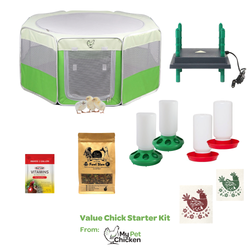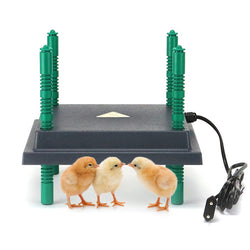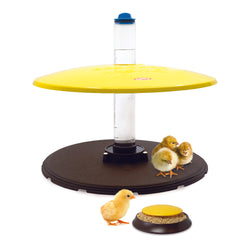Do geese make good pets? Can't they be mean or aggressive?
Back to blog
You may be surprised to find that the answer to both questions is...yes! Geese can make great pets, and yes, they can sometimes be aggressive. Before that surprises you too much, think about "man's best friend": the dog. Sometimes dogs can be aggressive, right? In fact, one reason some people keep a dog is to provide protection to their family or belongings. In spite of the fact that they can be aggressive, dogs make excellent pets. The same is true with geese. Like dogs, they are very smart, can form tight bonds with humans, and can be aggressive in certain situations. It's important to remember that the main player in the relationship between humans and animals is the human, because--in the case of geese--the human is the steward of the flock and can learn about goose behavior patterns and respond accordingly. When keeping any animals as pets it is important that humans learn as much as possible about their instincts, behavior, and needs, so that we can respond to them appropriately and provide them optimal care.

Sebastopol geese can make good pets.
Geese are easy to raise. Waterfowl like geese are less prone to most common poultry diseases and parasites and are very hardy in cold and wet weather. Generally, geese do not need to be vaccinated. A simple, secure, predator-proof structure will work to keep them safe at night, and if neighborhood dogs are not a threat, a 3-foot high chicken wire fence can keep flightless breeds contained during the day. Flighty individuals may need their their flight feathers clipped on one side. If neighborhood dogs are a problem, a taller, stronger fence will be required. You'll need to provide them clean drinking water and quality feed, but much of their food will come from the grass and bugs they will happily eat from your yard.
Geese are fun to have around. Most geese are friendly, and with personality galore, some individuals may bond with you much like a dog, follow you around, give you "gooseneck" hugs, and be very interested in what you're doing. They are beautiful, stately animals that are just enjoyable to watch and listen to, and sometimes they can be downright silly, which is very entertaining!
Long live the goose! Want a pet you can enjoy for a long time? Geese may be just what you're looking for! If cared for properly, geese normally live 10-15 years, but there are stories of some that have lived much, much longer--40 years or more! Unfortunately, since geese are prey animals, the main cause of death is usually predators--especially dogs. So the most important thing you can do to help your waterfowl live a long, happy life is to provide predator protection for them.
Geese are ravenous grazers. If plenty of young grass if available, geese can live and reproduce solely on grass, water, and grit, so long as you're not raising them for top growth and egg production. They can survive on wet lowlands and marshy areas that would make chickens susceptible to bacterial or fungal infections. They can clear out harvested crop fields, weeding and picking up dropped seeds as they go, along with consuming much of your leafy kitchen and garden waste and stale (not moldy) bread. Geese will consume many harmful weeds, fallen fruit in the orchard, and grass in difficult-to-reach places.
Geese can also provide excellent aquatic plant control. The number of geese you need per acre of water will depend on how invasive the plant species is you are attempting to combat, along with the soil and vegetation type around the pond, and whether the birds spend both days and nights on the pond. Geese will eat widgeon grass, pondweed, bulrush, eelgrass, algae, and duckweed. Please note, however: they have not been shown to be effective at controlling tropical water hyacinth or water-lettuce.
Two words: HUGE eggs! Some breeds of geese will lay as many as 60 to 100 eggs per year. That's not as many as some chicken or duck breeds, which can lay 250+ eggs per year, but it's important to remember that goose eggs are as much as three times larger than the average chicken egg! Goose eggs can be used like any other poultry egg--in recipes, as breakfast, and more. How do they taste? The answer lies in each person's individual palate. Some say the flavor is just like a chicken's egg, while others may think it's more like a duck's, and still others may not like them by themselves because they think they are too strongly flavored or don't like the texture. If you find that your family doesn't prefer the taste of goose eggs alone, you can still use them in recipes (and we bet no one will know the difference!).
"Guard geese" are valuable watchdogs. Geese are very aware of their surroundings and will honk to let you know if unfamiliar animals or humans have entered the yard. In some cases, they will even chase the perceived threat away!
So...geese are great, right? Is that whole story? Well, no. As with any pet, it's not always a walk in the park. It's important to stay grounded--even when you're keeping birds! So here you go:
Geese are large, strong birds with unique personalities. The Large Dewlap Toulouse can weigh as much as 25 pounds! Though most individuals will be docile, some geese can be aggressive--especially males during mating season--so it's a good idea to avoid invading their territory during that time of year. Give them plenty of room to breed and watch over their nests. Some breeds, such as the Sebastopol, Pilgrim, and American Buff seem to be more docile. However, in some situations, the females are very aggressive and the males are very tame. Some geese can be "trained" to be less aggressive. Often, a very young, "imprinted" gosling will still be very bonded to its owners as an adult, but sometimes that very same goose will become aggressive since it doesn't have any respect or fear of humans. It boils down to the fact that each goose is an individual and will respond according to their own unique personalities.
You can learn more about how to handle aggressive geese here.

Young pet gosling enjoying a drink.
Geese can be noisy. Ah, yes...the haunting honking of a gaggle of geese, echoing across a placid pond on a cool morning, It's poetic and peaceful...and to some people, downright annoying! If those people are your close neighbors,|then you have a problem. Chinese and African breeds tend to be the noisiest, so you may want to choose calmer breeds like American Buff, Pilgrims, or Toulouse if you're concerned about irritated neighbors.
Too many geese will negatively affect a pond's ecosystem. Just enough waterfowl can be beneficial to a pond's health, but too many geese or ducks may speed bank erosion, decimate plant life, and pollute smaller bodies of water. There are a variety of factors influencing the "carrying capacity" of a pond, including soil and vegetation type around the pond, whether the birds are on the pond day and night, and more. Each pond needs careful assessment and monitoring to evaluate how many waterfowl will work well for a particular situation.
Geese can destroy gardens. Since geese eat nearly every plant that humans do, having geese in the garden during growing season is not usually a good idea because they'll eat your harvest! Fortunately, you can keep geese excluded with a simple twenty-four to thirty-six-inch fence or netting. Once growing season is over, you can allow the geese into the garden to pick up any grounded produce, clear out and control invasive weeds, and apply their special brand of fertilizer (ahem...poop!). Generally, many of the tips for gardening with chickens apply to geese as well.
There you have it! Geese can make wonderful pets, and yes, they can be aggressive at times, too. After reading this article, you may have decided geese are not for you, and that's okay! Others may be itching to get some geese. That's great, too! With good management practices, you'll accentuate the positive aspects of goosekeeping, mitigate the challenging ones, and enjoy your flock of geese for many years to come!

Sebastopol geese can make good pets.
What's so great about geese?
Geese are easy to raise. Waterfowl like geese are less prone to most common poultry diseases and parasites and are very hardy in cold and wet weather. Generally, geese do not need to be vaccinated. A simple, secure, predator-proof structure will work to keep them safe at night, and if neighborhood dogs are not a threat, a 3-foot high chicken wire fence can keep flightless breeds contained during the day. Flighty individuals may need their their flight feathers clipped on one side. If neighborhood dogs are a problem, a taller, stronger fence will be required. You'll need to provide them clean drinking water and quality feed, but much of their food will come from the grass and bugs they will happily eat from your yard.
Geese are fun to have around. Most geese are friendly, and with personality galore, some individuals may bond with you much like a dog, follow you around, give you "gooseneck" hugs, and be very interested in what you're doing. They are beautiful, stately animals that are just enjoyable to watch and listen to, and sometimes they can be downright silly, which is very entertaining!
Long live the goose! Want a pet you can enjoy for a long time? Geese may be just what you're looking for! If cared for properly, geese normally live 10-15 years, but there are stories of some that have lived much, much longer--40 years or more! Unfortunately, since geese are prey animals, the main cause of death is usually predators--especially dogs. So the most important thing you can do to help your waterfowl live a long, happy life is to provide predator protection for them.
Geese are ravenous grazers. If plenty of young grass if available, geese can live and reproduce solely on grass, water, and grit, so long as you're not raising them for top growth and egg production. They can survive on wet lowlands and marshy areas that would make chickens susceptible to bacterial or fungal infections. They can clear out harvested crop fields, weeding and picking up dropped seeds as they go, along with consuming much of your leafy kitchen and garden waste and stale (not moldy) bread. Geese will consume many harmful weeds, fallen fruit in the orchard, and grass in difficult-to-reach places.
Geese can also provide excellent aquatic plant control. The number of geese you need per acre of water will depend on how invasive the plant species is you are attempting to combat, along with the soil and vegetation type around the pond, and whether the birds spend both days and nights on the pond. Geese will eat widgeon grass, pondweed, bulrush, eelgrass, algae, and duckweed. Please note, however: they have not been shown to be effective at controlling tropical water hyacinth or water-lettuce.
Two words: HUGE eggs! Some breeds of geese will lay as many as 60 to 100 eggs per year. That's not as many as some chicken or duck breeds, which can lay 250+ eggs per year, but it's important to remember that goose eggs are as much as three times larger than the average chicken egg! Goose eggs can be used like any other poultry egg--in recipes, as breakfast, and more. How do they taste? The answer lies in each person's individual palate. Some say the flavor is just like a chicken's egg, while others may think it's more like a duck's, and still others may not like them by themselves because they think they are too strongly flavored or don't like the texture. If you find that your family doesn't prefer the taste of goose eggs alone, you can still use them in recipes (and we bet no one will know the difference!).
"Guard geese" are valuable watchdogs. Geese are very aware of their surroundings and will honk to let you know if unfamiliar animals or humans have entered the yard. In some cases, they will even chase the perceived threat away!
So...geese are great, right? Is that whole story? Well, no. As with any pet, it's not always a walk in the park. It's important to stay grounded--even when you're keeping birds! So here you go:
What are some things to consider when keeping geese?
Geese are large, strong birds with unique personalities. The Large Dewlap Toulouse can weigh as much as 25 pounds! Though most individuals will be docile, some geese can be aggressive--especially males during mating season--so it's a good idea to avoid invading their territory during that time of year. Give them plenty of room to breed and watch over their nests. Some breeds, such as the Sebastopol, Pilgrim, and American Buff seem to be more docile. However, in some situations, the females are very aggressive and the males are very tame. Some geese can be "trained" to be less aggressive. Often, a very young, "imprinted" gosling will still be very bonded to its owners as an adult, but sometimes that very same goose will become aggressive since it doesn't have any respect or fear of humans. It boils down to the fact that each goose is an individual and will respond according to their own unique personalities.
You can learn more about how to handle aggressive geese here.

Young pet gosling enjoying a drink.
Geese can be noisy. Ah, yes...the haunting honking of a gaggle of geese, echoing across a placid pond on a cool morning, It's poetic and peaceful...and to some people, downright annoying! If those people are your close neighbors,|then you have a problem. Chinese and African breeds tend to be the noisiest, so you may want to choose calmer breeds like American Buff, Pilgrims, or Toulouse if you're concerned about irritated neighbors.
Too many geese will negatively affect a pond's ecosystem. Just enough waterfowl can be beneficial to a pond's health, but too many geese or ducks may speed bank erosion, decimate plant life, and pollute smaller bodies of water. There are a variety of factors influencing the "carrying capacity" of a pond, including soil and vegetation type around the pond, whether the birds are on the pond day and night, and more. Each pond needs careful assessment and monitoring to evaluate how many waterfowl will work well for a particular situation.
Geese can destroy gardens. Since geese eat nearly every plant that humans do, having geese in the garden during growing season is not usually a good idea because they'll eat your harvest! Fortunately, you can keep geese excluded with a simple twenty-four to thirty-six-inch fence or netting. Once growing season is over, you can allow the geese into the garden to pick up any grounded produce, clear out and control invasive weeds, and apply their special brand of fertilizer (ahem...poop!). Generally, many of the tips for gardening with chickens apply to geese as well.
There you have it! Geese can make wonderful pets, and yes, they can be aggressive at times, too. After reading this article, you may have decided geese are not for you, and that's okay! Others may be itching to get some geese. That's great, too! With good management practices, you'll accentuate the positive aspects of goosekeeping, mitigate the challenging ones, and enjoy your flock of geese for many years to come!



